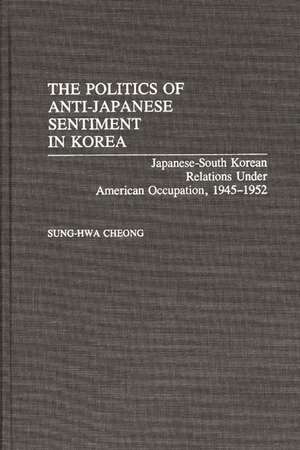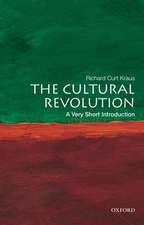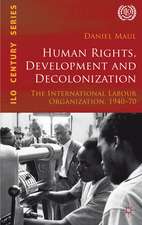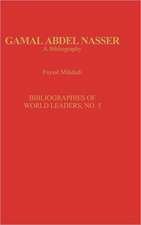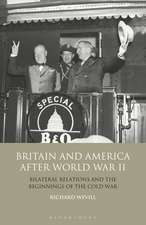The Politics of Anti-Japanese Sentiment in Korea: Japanese-South Korean Relations Under American Occupation, 1945-1952: Contributions to the Study of World History
Autor Sung-Hwa Cheongen Limba Engleză Hardback – 21 noi 1991 – vârsta până la 17 ani
Din seria Contributions to the Study of World History
- 27%
 Preț: 463.13 lei
Preț: 463.13 lei - 27%
 Preț: 345.23 lei
Preț: 345.23 lei - 28%
 Preț: 435.48 lei
Preț: 435.48 lei - 38%
 Preț: 436.99 lei
Preț: 436.99 lei - 27%
 Preț: 439.69 lei
Preț: 439.69 lei - 38%
 Preț: 437.67 lei
Preț: 437.67 lei - 27%
 Preț: 440.20 lei
Preț: 440.20 lei - 28%
 Preț: 460.60 lei
Preț: 460.60 lei - 28%
 Preț: 495.69 lei
Preț: 495.69 lei - 28%
 Preț: 436.57 lei
Preț: 436.57 lei - 24%
 Preț: 460.01 lei
Preț: 460.01 lei - 28%
 Preț: 436.22 lei
Preț: 436.22 lei - 27%
 Preț: 443.57 lei
Preț: 443.57 lei - 27%
 Preț: 438.33 lei
Preț: 438.33 lei - 27%
 Preț: 345.74 lei
Preț: 345.74 lei - 28%
 Preț: 438.00 lei
Preț: 438.00 lei - 28%
 Preț: 437.84 lei
Preț: 437.84 lei - 28%
 Preț: 437.84 lei
Preț: 437.84 lei - 38%
 Preț: 440.36 lei
Preț: 440.36 lei - 27%
 Preț: 440.61 lei
Preț: 440.61 lei - 24%
 Preț: 461.87 lei
Preț: 461.87 lei - 28%
 Preț: 437.91 lei
Preț: 437.91 lei - 28%
 Preț: 498.40 lei
Preț: 498.40 lei - 35%
 Preț: 464.48 lei
Preț: 464.48 lei - 27%
 Preț: 465.68 lei
Preț: 465.68 lei - 24%
 Preț: 463.55 lei
Preț: 463.55 lei - 28%
 Preț: 460.60 lei
Preț: 460.60 lei - 28%
 Preț: 438.17 lei
Preț: 438.17 lei - 24%
 Preț: 463.05 lei
Preț: 463.05 lei - 28%
 Preț: 460.60 lei
Preț: 460.60 lei - 38%
 Preț: 345.74 lei
Preț: 345.74 lei - 27%
 Preț: 437.67 lei
Preț: 437.67 lei - 24%
 Preț: 462.97 lei
Preț: 462.97 lei - 28%
 Preț: 436.47 lei
Preț: 436.47 lei - 24%
 Preț: 460.93 lei
Preț: 460.93 lei - 27%
 Preț: 440.20 lei
Preț: 440.20 lei - 27%
 Preț: 364.22 lei
Preț: 364.22 lei - 28%
 Preț: 437.40 lei
Preț: 437.40 lei - 28%
 Preț: 344.90 lei
Preț: 344.90 lei - 27%
 Preț: 438.84 lei
Preț: 438.84 lei - 24%
 Preț: 464.40 lei
Preț: 464.40 lei - 27%
 Preț: 463.38 lei
Preț: 463.38 lei - 28%
 Preț: 436.99 lei
Preț: 436.99 lei - 27%
 Preț: 439.34 lei
Preț: 439.34 lei - 27%
 Preț: 345.90 lei
Preț: 345.90 lei - 28%
 Preț: 462.61 lei
Preț: 462.61 lei - 24%
 Preț: 463.97 lei
Preț: 463.97 lei - 19%
 Preț: 462.20 lei
Preț: 462.20 lei - 27%
 Preț: 581.72 lei
Preț: 581.72 lei
Preț: 461.28 lei
Preț vechi: 637.72 lei
-28% Nou
Puncte Express: 692
Preț estimativ în valută:
88.28€ • 91.82$ • 72.88£
88.28€ • 91.82$ • 72.88£
Carte tipărită la comandă
Livrare economică 14-28 aprilie
Preluare comenzi: 021 569.72.76
Specificații
ISBN-13: 9780313274107
ISBN-10: 031327410X
Pagini: 208
Dimensiuni: 156 x 235 x 16 mm
Greutate: 0.48 kg
Ediția:New.
Editura: Bloomsbury Publishing
Colecția Praeger
Seria Contributions to the Study of World History
Locul publicării:New York, United States
ISBN-10: 031327410X
Pagini: 208
Dimensiuni: 156 x 235 x 16 mm
Greutate: 0.48 kg
Ediția:New.
Editura: Bloomsbury Publishing
Colecția Praeger
Seria Contributions to the Study of World History
Locul publicării:New York, United States
Notă biografică
SUNG-HWA CHEONG is Assistant Professor of History at Myonji University in Korea. He has contributed articles to Korea Journal and Japanology.
Cuprins
IntroductionThe Political Use of Anti-Japanese Sentiment in Korea: The Case of the Opposition GroupsThe MacArthur Line and the Manipulation of Anti-Japanese Sentiment in KoreaThe Territorial Dispute Between Japan and the ROKKorean Demands for War ReparationsThe Nationality of Korean Residents in JapanThe ROK and the San Francisco Peace TreatyThe First Conference for Normalization of Diplomatic Relationships Between Japan and the ROKPolitical Crisis in Korea and the Consolidation of Korean Images on Various Issues Raised by Synghman RheeConclusionBibliographyIndex
